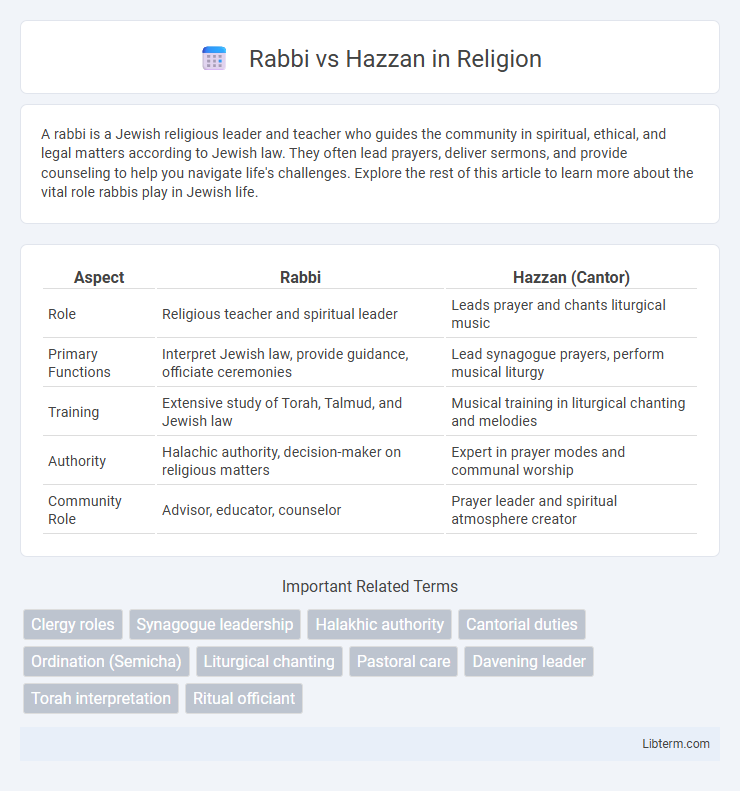A rabbi is a Jewish religious leader and teacher who guides the community in spiritual, ethical, and legal matters according to Jewish law. They often lead prayers, deliver sermons, and provide counseling to help you navigate life's challenges. Explore the rest of this article to learn more about the vital role rabbis play in Jewish life.
Table of Comparison
| Aspect | Rabbi | Hazzan (Cantor) |
|---|---|---|
| Role | Religious teacher and spiritual leader | Leads prayer and chants liturgical music |
| Primary Functions | Interpret Jewish law, provide guidance, officiate ceremonies | Lead synagogue prayers, perform musical liturgy |
| Training | Extensive study of Torah, Talmud, and Jewish law | Musical training in liturgical chanting and melodies |
| Authority | Halachic authority, decision-maker on religious matters | Expert in prayer modes and communal worship |
| Community Role | Advisor, educator, counselor | Prayer leader and spiritual atmosphere creator |
Introduction to Rabbi and Hazzan Roles
A Rabbi serves as a spiritual leader and teacher within the Jewish community, responsible for interpreting Jewish law, conducting religious services, and providing guidance on ethical and theological matters. A Hazzan, or cantor, specializes in leading the musical aspects of worship, chanting prayers, and enhancing the liturgical experience through song. Both roles are integral to Jewish religious life, with the Rabbi focusing on legal and educational duties while the Hazzan emphasizes musical leadership.
Historical Origins of Rabbi and Hazzan
The historical origins of the Rabbi date back to the Pharisaic movement during the Second Temple period, evolving as Jewish religious scholars and teachers who interpreted Jewish law and led communities. The Hazzan, or cantor, emerged primarily during the early Middle Ages as a liturgical singer responsible for leading the congregation in prayer and chanting sacred texts. Both roles developed distinct religious functions, with Rabbinic authority centered on legal and teaching responsibilities while the Hazzan specialized in ritual and musical aspects of worship.
Core Responsibilities of a Rabbi
A Rabbi's core responsibilities include interpreting Jewish law (Halacha), leading religious services, providing spiritual guidance, and delivering sermons to educate and inspire the community. They also officiate life cycle events such as weddings, funerals, and bar or bat mitzvahs, ensuring these rites adhere to religious traditions. In contrast, a Hazzan (cantor) primarily leads the congregation in prayer through chanting and singing, focusing on musical aspects of worship rather than legal or pastoral duties.
Core Duties of a Hazzan
A Hazzan, also known as a cantor, specializes in leading the congregation in prayer through melodic chanting and singing, playing a vital role in synagogue worship. Core duties of a Hazzan include performing liturgical music, guiding the community in prayer rituals, and often providing spiritual support and education in Jewish traditions. Unlike a Rabbi, whose primary responsibilities involve teaching law, providing pastoral care, and making halachic decisions, the Hazzan focuses on enhancing the prayer experience and fostering a communal connection through sacred music.
Educational Requirements for Rabbis and Hazzans
Rabbis typically undergo extensive formal education, including years of study in Jewish law, theology, and Talmudic texts often culminating in semicha (rabbinic ordination) from accredited yeshivas or rabbinical schools. Hazzans, or cantors, usually complete specialized training in liturgical music, Hebrew language, and religious rituals at cantorial programs or conservatories, sometimes earning degrees in sacred music or biblical studies. While both roles require deep religious knowledge, rabbis emphasize legal and spiritual leadership education, whereas hazzans focus on musical and prayer leadership training.
Leadership and Community Functions
A Rabbi serves as the spiritual leader and educator within the Jewish community, responsible for teaching Torah, providing pastoral care, and making halachic decisions. In contrast, a Hazzan, or cantor, leads the congregation in prayer through chanting and singing, enhancing communal worship and religious ceremonies. Both roles are vital for fostering spiritual growth and community cohesion, with the Rabbi primarily guiding religious law and life cycle events, while the Hazzan specializes in musical leadership and liturgical traditions.
Ritual and Liturgical Roles Compared
The Rabbi primarily serves as a spiritual leader responsible for teaching, interpreting Jewish law, and providing pastoral guidance, while the Hazzan (cantor) specializes in leading the congregation in prayer through melodic chant and liturgical music. Ritual roles of the Rabbi often include officiating at life-cycle events such as weddings and funerals, whereas the Hazzan focuses on enhancing worship experiences with vocal artistry during Sabbath and holiday services. Both roles are essential to Jewish communal life, with the Rabbi guiding legal and ethical aspects and the Hazzan enriching prayer through ritual song.
Rabbi vs Hazzan: Differences in Training
Rabbi training typically involves extensive formal education in Jewish law, theology, and pastoral counseling, often requiring several years of study at a yeshiva or seminary. In contrast, a Hazzan (cantor) focuses on specialized musical training and liturgical expertise, emphasizing cantillation, prayer melodies, and synagogue leadership in ritual services. While rabbis are ordained to provide religious guidance and legal rulings, hazzanim receive certification primarily to lead prayer and enhance communal worship through song.
Collaboration Between Rabbis and Hazzans
Rabbis and Hazzans collaborate closely in Jewish religious life, with Rabbis providing spiritual leadership and legal guidance, while Hazzans lead the congregation in prayer through liturgical chanting and musical expertise. This partnership enhances worship experiences by blending theological instruction with melodic traditions, ensuring services are both educational and spiritually uplifting. Their joint efforts foster communal cohesion, support religious observance, and preserve cultural heritage within synagogues worldwide.
Modern Developments and Evolving Roles
Rabbi and Hazzan roles have evolved significantly in contemporary Judaism, reflecting broader community needs and societal changes. Modern rabbis often combine pastoral care, halachic expertise, and educational leadership, while hazzanim increasingly integrate musical innovation and communal engagement to enhance worship experiences. This shift highlights a collaborative dynamic that balances traditional religious authority with cultural and spiritual expression within diverse Jewish congregations.
Rabbi Infographic

 libterm.com
libterm.com